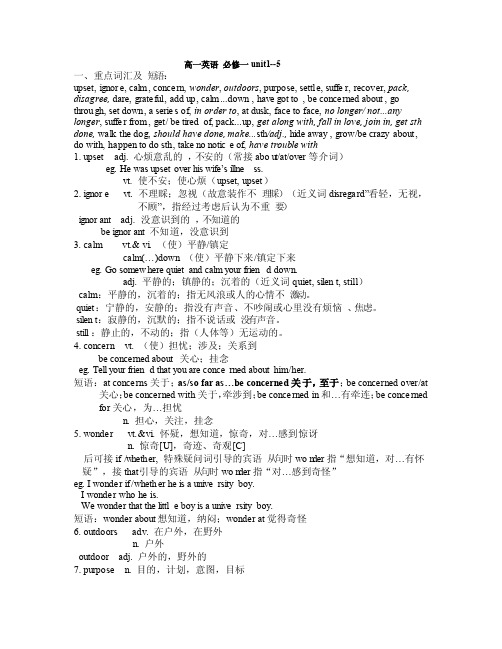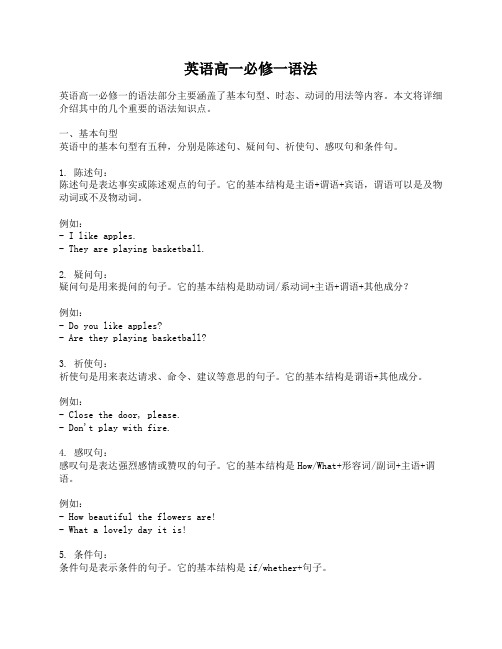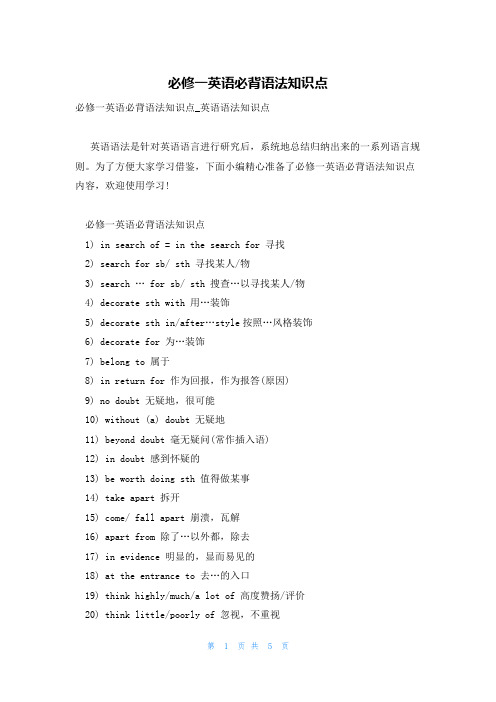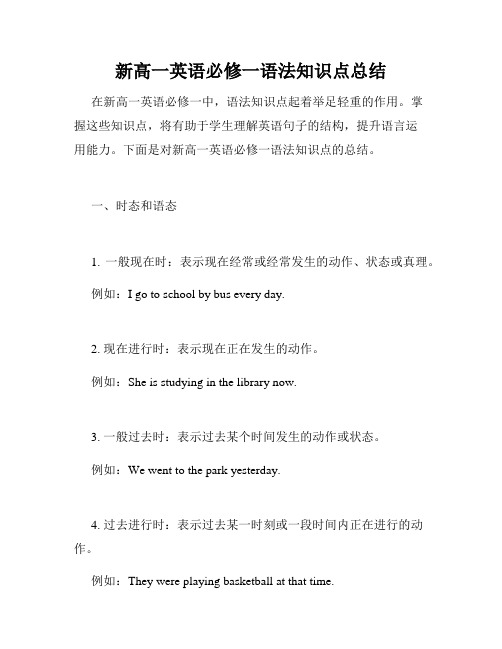高一英语必修一语法总结
高一英语必修一语法归纳

高一英语必修一 unit1--5一、重点词汇及短语:upset, ignore, calm, concer n, wonder, outdoo rs, purpos e, settle, suffer, recove r, pack, disagr ee, dare, gratef ul, add up, calm...down , have got to , be concer ned about, gothroug h, set down, a series of, in orderto, at dusk, face to face, no longer/ not...any longer, suffer from, get/ be tiredof, pack...up, get alongwith, fall in love, join in, get sth done, walk the dog, should have done, make...sth/adj., hide away, grow/be crazyabout, do with, happen to do sth, take no notice of, have troubl e with1. upsetadj. 心烦意乱的,不安的(常接abou t/at/over等介词)eg. He was upsetoverhiswife‘sillnes s.vt. 使不安;使心烦(upset, upset)2. ignore vt. 不理睬;忽视(故意装作不理睬)(近义词disregar d‖看轻,无视,不顾‖,指经过考虑后认为不重要)ignora nt adj. 没意识到的,不知道的be ignora nt 不知道,没意识到3. calm vt.& vi. (使)平静/镇定calm(…)down(使)平静下来/镇定下来eg. Go somewh ere quietand calm your friend down.adj. 平静的;镇静的;沉着的(近义词quiet, silent, still)calm:平静的,沉着的;指无风浪或人的心情不激动。
英语高一必修一语法

英语高一必修一语法英语高一必修一的语法部分主要涵盖了基本句型、时态、动词的用法等内容。
本文将详细介绍其中的几个重要的语法知识点。
一、基本句型英语中的基本句型有五种,分别是陈述句、疑问句、祈使句、感叹句和条件句。
1. 陈述句:陈述句是表达事实或陈述观点的句子。
它的基本结构是主语+谓语+宾语,谓语可以是及物动词或不及物动词。
例如:- I like apples.- They are playing basketball.2. 疑问句:疑问句是用来提问的句子。
它的基本结构是助动词/系动词+主语+谓语+其他成分?例如:- Do you like apples?- Are they playing basketball?3. 祈使句:祈使句是用来表达请求、命令、建议等意思的句子。
它的基本结构是谓语+其他成分。
例如:- Close the door, please.- Don't play with fire.4. 感叹句:感叹句是表达强烈感情或赞叹的句子。
它的基本结构是How/What+形容词/副词+主语+谓语。
例如:- How beautiful the flowers are!- What a lovely day it is!5. 条件句:条件句是表示条件的句子。
它的基本结构是if/whether+句子。
例如:- If it rains tomorrow, we will stay at home.- Whether she comes or not, I will go to the party.二、时态在英语中,时态用于表示动作发生的时间。
高一必修一中涵盖了一般现在时、一般过去时、一般将来时等几个基本时态。
1. 一般现在时:一般现在时用于表示经常性的动作、习惯、真理、科学事实等。
它的基本结构是主语+谓语。
例如:- She goes to school every day.- Water boils at 100 degrees Celsius.2. 一般过去时:一般过去时用于表示过去发生的动作或状态。
必修一英语必背语法知识点

必修一英语必背语法知识点必修一英语必背语法知识点_英语语法知识点英语语法是针对英语语言进行研究后,系统地总结归纳出来的一系列语言规则。
为了方便大家学习借鉴,下面小编精心准备了必修一英语必背语法知识点内容,欢迎使用学习!必修一英语必背语法知识点1) in search of = in the search for 寻找2) search for sb/ sth 寻找某人/物3) search … for sb/ sth 搜查…以寻找某人/物4) decorate sth with 用…装饰5) decorate sth in/after…style按照…风格装饰6) decorate for 为…装饰7) belong to 属于8) in return for 作为回报,作为报答(原因)9) no doubt 无疑地,很可能10) without (a) doubt 无疑地11) beyond doubt 毫无疑问(常作插入语)12) in doubt 感到怀疑的13) be worth doing sth 值得做某事14) take apart 拆开15) come/ fall apart 崩溃,瓦解16) apart from 除了…以外都,除去17) in evidence 明显的,显而易见的18) at the entrance to 去…的入口19) think highly/much/a lot of 高度赞扬/评价20) think little/poorly of 忽视,不重视高一英语必修一知识点归纳笔记复习时要把握三点:A. 要注意理解情景意义:同一介词可表达多种意义,同一场合意义不同则介词不同。
He hasn’t come for a month .(for 持续时间)The day is warm for April .(for 就……而言)B. 要突破几个关键介词in , on , at , with , by , from , of , to , for .1 . 表示时间的:at; in ; on , since , from , to , after , within , during , throughout , towards , over , by , till ;2 . 表示穿越的:through , across , over3.表示地理位置的:in ; on; to ;4.表示原因、目的的:for ;with ; from ;5. 表示关于的:about , concerning , regarding , with regard to , as for ,as to ;6. 表示根据:on ; according to ;7. in the corner ;on the corner , at the corner 的区别8.between 和among9.besides ;except ; but ;except for10.in 和withC. 要注意介词搭配,集中归纳,反复练习。
高一英语必修一语法要点

高一英语必修一语法要点一.一般现在时1. 表示主语现在所处的状态及其所具备的特征、性格、能力等例如:I am a girl.2. 表示习惯性、经常性的动作例如:I usually go to bed at 9:00.3. 标志性的词语Always often sometimes now and then4. 若助于为第三人称单数(he she it)则动词要用单三现二.现在进行时1.说话时正在进行的动作例如:I am reading.2.表示即将发生的动作,多用于go come start leave return arrive stay fly等词语之中,句子中常常有时间状语例如:The plane is going to Beijing.3.当句子中出现了always 、forever 、constantly 、continually 、All the time等例如:I am always thinking of you.三.倍数比较1.A+系动词+倍数词+as+ adj \adv的原型+as+B例如:The class is twice as big as that one.2.A+系动词+倍数词+adj\adv的比较级+than+B例如:The class is twice bigger than that class.3.A+系动词+倍数词+the size\amount(数量)\ength\width\height\depth\+of+B例如:The class is twice the size of that class.四.With的复合结构1.With+宾语+宾语补足语宾语补足语根据逻辑意义的不同可以是不同的词语,如形容词、现在分词、过去分词、副词、介词短语、不定式等,with在复合结构中常作状语2.常用结构○1with+宾语+doing表主动与进行例如:Tom was quite safe with Lucy standing behind him.○2with+宾语+done表被动与完成例如:With all things she need bought,she went home.○3with+宾语+to do表将来例如:With so many thing to deal with.五.现在完成进行时现在完成进行时1.基本表达式(I have been doing )I/ we/ you/ they have been doing sth.he/ she/ it has been doing sth.2.表示从过去某时开始一直持续到现在的动作,并且还将持续下去。
新版高中英语必修一的语法知识点与归纳总结

新版高中英语必修一的语法知识点与归纳总结
新版高中英语必修一的语法知识点主要包括:
1. 一般现在时:表示经常性或习惯性的动作、真理、客观事实等。
2. 现在进行时:表示正在进行的动作。
3. 一般过去时:表示过去某个时间发生的动作或存在的状态。
4. 过去进行时:表示过去某个时间正在进行的动作。
5. 一般将来时:表示将来某个时间会发生的动作。
6. 情态动词:包括can、could、may、might、must、shall、should、will、would、ought to等,用来表示能力、许可、可能性、必须性、义务等。
7. 被动语态:表示动作的承受者在句子中是主语。
8. 定语从句:用来修饰名词或代词的从句。
9. 状语从句:用来修饰动词、形容词、副词的从句。
10. 名词性从句:用来充当主语、宾语、表语、同位语的从句。
归纳总结:
1. 时态:一般现在时、现在进行时、一般过去时、过去进行时、一般将来时。
2. 情态动词:can、could、may、might、must、shall、should、will、would、ought to。
3. 被动语态:be + 过去分词。
4. 定语从句:关系代词who、whom、whose、which、that 引导。
5. 状语从句:时间状语从句、地点状语从句、原因状语从句、条件状语从句、结果状语从句等。
6. 名词性从句:主语从句、宾语从句、表语从句、同位语
从句。
这些是新版高中英语必修一的主要语法知识点和归纳总结,希望对你有帮助!。
高一英语必修一语法知识点总结

高一英语必修一语法知识点总结高一英语必修一语法知识点1高一英语必修一知识点总结:Unit11.be good to对……友好be good for对……有益;be bad to…/be bad for…2.add up加起来增加add up to合计,总计add…to把……加到……3.not…until/till意思是“直到…才”4.get sth/sb done使……完成/使某人被……5.calm down平静下来6.be concerned about关心,关注7.当while,when,before,after 等引导的时间状语从句中的主语与主句的主语一致时,可将从句中的主语和be动词省去。
While walking the dog,you were careless and it got loose.8.cheat in the exam考试9.go through经历;度过;获准,通过10.hide away躲藏;隐藏11.set down写下,记下12.I wo nder if…我不知道是不是…12.on purpose故意13.sth happen to sb某人发生某事sb happen to do sth某人碰巧做某事it so happened that……正巧碰巧14.It is the first(second…)that…(从句谓语动词用现在完成时)15.in one’s power处于……的控制之中16.It’s no pleasure doing…做…没有乐趣It’s no good/use doi ng sth.做某事是没好处/没用的17.She found it difficult to settle and calm down in the hiding place.it 做形式宾语18.suffer from患…病;遭受19.so…that…/such…thay…20.get tired of…对…感到劳累疲惫21.have some trouble with sb/sth.在……上遇到了麻烦22.get along with sb/sth.与某人相处23.ask(sb)for advice.(向某人)征求建议24.make后接复合宾语,宾语补足语须用不带to的不定式、形容词、过去分词、名词等。
新高一英语必修一语法知识点总结

新高一英语必修一语法知识点总结在新高一英语必修一中,语法知识点起着举足轻重的作用。
掌握这些知识点,将有助于学生理解英语句子的结构,提升语言运用能力。
下面是对新高一英语必修一语法知识点的总结。
一、时态和语态1. 一般现在时:表示现在经常或经常发生的动作、状态或真理。
例如:I go to school by bus every day.2. 现在进行时:表示现在正在发生的动作。
例如:She is studying in the library now.3. 一般过去时:表示过去某个时间发生的动作或状态。
例如:We went to the park yesterday.4. 过去进行时:表示过去某一时刻或一段时间内正在进行的动作。
例如:They were playing basketball at that time.5. 现在完成时:表示过去发生的动作对现在仍有影响或结果。
例如:He has finished his homework.6. 过去完成时:表示过去某一个时间或动作先于另一个过去的时间或动作。
例如:They had already left when we arrived.7. 将来时:表示将来某个时间或将来情况下要发生的动作。
例如:She will visit her grandparents next week.8. 被动语态:将动词的对象改为主语,并用be动词进行变换。
例如:The book was written by Mark Twain.二、名词1. 可数名词:表示可以计数的名词。
例如:There are three apples on the table.2. 不可数名词:表示不可以计数的名词。
例如:There is some milk in the fridge.3. 可数名词的复数形式:加-s或-es。
例如:The boy has two brothers.4. 不可数名词的量词:使用量词来表示数量。
新版高中英语必修一语法归纳

新版高中英语必修一语法归纳以下是新版高中英语必修一的语法归纳:1. 一般现在时- 主谓一致:主语为第三人称单数时,动词加-s或-es结尾。
- 经常行为或习惯:常与频率副词(always, usually等)连用。
- 现在的状况:表现为客观事实,不受时间限制。
2. 一般过去时- 过去发生的动作或状态:一般用于描述过去的事件。
- 常用的过去时间状语:yesterday(昨天)、last week(上周)、two days ago(两天前)等。
3. 现在进行时- 正在进行的动作:强调当前正在进行的动作。
- 现阶段的暂时状态:暂时性动作或活动。
4. 一般将来时- 将来计划或打算:表示发生在将来的动作或事件。
- 含有明确将来时间状语的句子:tomorrow(明天)、next week(下周)等。
5. 宾语从句- 引导词:that, whether, if等引导宾语从句。
- 动词的时态:从句的谓语动词根据主从句的关系而选择相应的时态。
6. 定语从句- 引导词:关系代词(who, whom, whose, which, that)或关系副词(when, where, why)引导定语从句。
- 关系代词的选择:who和that可指人或物,而which和that 只能指物。
7. 状语从句- 时间状语从句:描述时间的状语从句,多由when, while, as soon as等引导。
- 原因状语从句:描述原因的状语从句,多由because, since, as 等引导。
- 条件状语从句:描述条件的状语从句,多由if, unless, so long as等引导。
8. 虚拟语气- 表示与事实相反的虚拟条件:主句用过去式、从句用过去完成时。
- 表示与现实相反的虚拟条件:主句用过去完成时、从句用过去完成时。
9. 非谓语动词- 动名词:作主语、宾语或表语,形式为动词+ing。
- 不定式:可以作主语、宾语、定语或状语,形式为to+动词原形。
- 1、下载文档前请自行甄别文档内容的完整性,平台不提供额外的编辑、内容补充、找答案等附加服务。
- 2、"仅部分预览"的文档,不可在线预览部分如存在完整性等问题,可反馈申请退款(可完整预览的文档不适用该条件!)。
- 3、如文档侵犯您的权益,请联系客服反馈,我们会尽快为您处理(人工客服工作时间:9:00-18:30)。
高中英语必修一语法汇总高一二部英语组一时态1. 一般现在时(时态)用法1)用于表示主语现在的性格特征,说话时的感觉,状态等。
I like swimming in summer.2) 表示反复发生动作或存在的状态。
He usually goes to work by bus.3) 表示客观事实或普遍真理。
The earth goes around the sun.4) 时间、条件、让步状语从句中。
If it is sunny, we will go camping tomorrow.5) 表按规定,计划等预计要发生的未来动作。
The next bus comes at 10 am.2. 现在进行时(时态)用法1)说话瞬间正在进行的动作。
Someone is waiting for you outside.2)现阶段正在进行的动作。
He’s writing a novel these days.3)表不满,愤怒,赞赏等情感。
She’s always finding fault with others.4)表委婉语气。
I’m hoping to hear from you soon.5)表将要发生动作。
The train is coming.3. 将来的安排和打算(不是时态,是表达将来的含义)有三种表达方式1)be going to依据现在观察到的迹象,预测将来会发生的事。
It is going to rain.表达想要做某事的企图。
I’m never going to buy a mobile phone.2)现在进行时表已经确定或安排好的将来事件(即现在进行时中第5条)The train is coming.3)一般现在时表未来的官方事件或不可改变的时间表(即一般现在时中第5条)The next bus comes at 10 am.4. 一般过去时(时态)用法1)过去完成的动作。
He won the match yesterday.2)过去反复发生的动作或状态。
They always went to cinema on Sunday.5. 过去进行(时态)用法1)过去某一时刻或某一段时间内持续动作。
I was watching TV at that time.2)表示位置移动的动词的过去进行时表示过去即将发生的动作。
(对应现在进行时第5条进行记忆)He knew his father was leaving for Shanghai the next day.3)表示说话者赞赏或厌恶的感情。
(对应现在进行时第3条进行记忆)As far as I know, he was always helping other.6. 现在完成时(时态)用法1)发生在过去但对现在有影响的动作。
I’ve lost my keys.2)过去单独发生或反复发生的动作,但是不知道确切的时间。
I’ve been to Beijing many times.3)发生在过去持续到现在,有可能继续进行下去。
I’ve always love travl.7. 被动(语态)用法1)不知道也不需要知道谁发出的动作。
The streets were decorated with flowers.2)动作发出者显而易见。
Rice is grown in the south of China.3)动作本身更重要。
These beliefs were not encouraged by the church.构成一般现在时am/is/are+动词过去分词现在进行时am/is/are being+动词过去分词现在完成时have/has been+动词过去分词一般过去时was/were+动词过去分词过去进行时was/were being+动词过去分词过去完成时had been+动词过去分词过去将来时would be+动词过去分词一般将来时be going to be+动词过去分词8. 情态动词(词性)用法can1)表示允许或请求允许Can I watch TV now?2)表可能性Winter in England can be quite warm.3)表能力I can ride a horse but I can’t drive.can’t1)can’t…too…表示无论怎样都不过分You can’t be too careful to cross the road.2)can’t help but do sth/ can’t help doing 禁不住I can’t help but often think of my parents.When I try to speak, I can’t help making mistakes.3)can’t wait to do 迫不及待做某事I can’t wait to open the box.小试身手1. --Do you know if Terry will go camping this weekend?--Terry? Never! She_____ tents and fresh air!A. has hatedB. hatedC. will hateD. hates2. “Life is like walking in the snow,” Granny used to say, “because every step_____.”A. has shownB. is showingC. showsD. showed3. Teenagers ______ their health because they play computer games too much.A. have damagedB. are damagingC. damagedD. will damage4. -- Have you got any job offers?-- No. I _____.A. waitedB. had been waitingC. have waitedD. am waiting5. Ladies and gentlemen, please fasten your seat belts. The plane _____.A. take offB. is taking offC. has taken offD. took off6. Would you please keep silent? The weather report _____ and I want to listen.A. is broadcastB. is being broadcastC. has been broadcastD. had been broadcast7. Look at the timetable. Hurry up! Flight 4026 ______ off at 18:20.A. takesB. tookC. will be takenD. has taken8. They are living with their parents for the moment because their own house _____.A. is being builtB. has been rebuiltC. is rebuiltD. has rebuilt9. ____ I always felt I would pass the exam, I never thought I would get an AA. WhileB. OnceC. IfD. Until10. I ____ you not to move my dictionary---now I can’t find it.A. askedB. askC. was askingD. had asked11. ---Did you catch what I said?---Sorry. I ____ a text message just now.A. had answeredB. have answeredC. would answerD. was answering12. ---I remember you were a talented pianist at college. Can you play the piano forme?--- Sorry, I ____ the piano for years.A. don’t playB. wasn’t playingC. haven’t playedD. hadn’t played13.--- You haven’t said a word about my new coat, Brenda. Do you like it?---I’m sorry I____anything about it sooner. I certainly think it’s pretty on you.A. wasn’t sayingB. don’tC. won’t sayD. didn’t say14.How can you possibly miss the news? It ____ on TV all day long.A. has beenB. had beenC. wasD. will be15.The way the guests_____in the hotel influenced their evaluation of the service.A. treatedB. were treatedC. would treatD. would be treated16.The letters for the boss ____on his desk but he didn’t read them until three days later.A. were putB. was putC. putD. has put17.I ____think you too much for all your help to my son while we were away from home.A. won’tB. can’tC. canD. will18.Rod loves_____clocks. However, he never manages to put them together again.A. taking apartB. giving awayC. making upD. turning off19.---Did you ask Sophia for help?---I____need to---I managed perfectly well on my own.A. wouldn’tB. don’tC. didn’tD. won’t20.---Look! Somebody____the sofa.---Well, it wasn’t me. I didn’t do it.A. is cleaningB. was cleaningC. has cleanedD. had cleaned21._____around the fire, the tourists danced with the local people.A. GatherB. To gatherC. GatheringD. To be gathering22.Do you wake up every morning ______energetic and ready to start a new day?A. feelB. to feelC. feelingD. felt23._____regular exercise is very important.It’s never a good idea to exercise too close to bedtime.A. IfB. AsC. AlthoughD. Unless24.I often____the words I don’t know in the dictionary or on the Internet.A. look upB. look atC. look forD. look into25.---That must have been a long trip.---Yeah, it____us a whole week to get there.A. takesB. has takenC. tookD. was taking。
